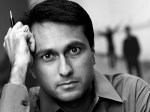 Eboo Patel made some powerful observations about the hard work of learning how to get along with people who are different from you. The founder and director of the Interfaith Youth Core, based in Chicago, was at Santa Clara University as part of the President’s Speaker Series. Throughout his presentation, he highlighted the strengths that traditions like the Jesuit Christian tradition and Muslim traditions serve to inspire and undergird efforts to build bridges between people of differing traditions and backgrounds.
Eboo Patel made some powerful observations about the hard work of learning how to get along with people who are different from you. The founder and director of the Interfaith Youth Core, based in Chicago, was at Santa Clara University as part of the President’s Speaker Series. Throughout his presentation, he highlighted the strengths that traditions like the Jesuit Christian tradition and Muslim traditions serve to inspire and undergird efforts to build bridges between people of differing traditions and backgrounds.
The United States, he reminded the audience, was the first experiment in democracy that encompassed a diverse population. “Diversity is stunningly challenging,” Patel declared, suggesting that often we take it too much for granted. Religious diversity in particular has the potential to spark conflict, as it implies deep differences around fundamental values. Any day in the world news, one can hear about religious conflicts that have exploded into violence, but seldom does that happen here.
Diversity is a fact of modern life, Patel affirmed, and quoted the sociologist Peter Berger to say that “modernity pluralizes.” This means that one’s culture becomes a choice, rather than a fate, and the number of options available to the individual are increasing in number. In this pluralistic context, however, social cohesion and “social capital,” the “glue” that holds a society together, are weakened. One possibility is that people in their diverse clusters will become increasingly hostile to others, leading to what has been widely described as a “clash of civilizations,” a phrase that was popularized by the book of the same name by Samuel Huntington in 1996.
“I don’t like that idea,” said Patel, “but that doesn’t mean it’s not true.” In classes, he will have his students read the introduction to Huntington’s book and then write a paper about the reasons why they don’t like the theory and about where they see evidence in the world around them that Huntington is correct.
Diversity has the potential to bring about such conflict, but Patel argues that it’s not inevitable. Diversity in itself is simply a given; it is only when diversity can be moved toward pluralism that we begin to achieve the true vision of democracy. Pluralism is an achievement, and requires conscious effort to built mutual respect, positive relationships among differing people, and a commitment to the common good.
Patel called for young leaders trained in interfaith leadership. Just as past generations have seen emerging civil rights workers or environmentalists responding to the need for deeper understanding of the challenges society faces and an ongoing engagement with each other and the community at large, there is now a need for people trained, skilled, and committed to developing pluralism.
“Always look for the resonances,” Patel challenged the audience. The greatest challenge is to identify that person or group with which you most profoundly disagree, and then look for something you can admire about them. There is no other world than a diverse world and it is amazing what we can do together.